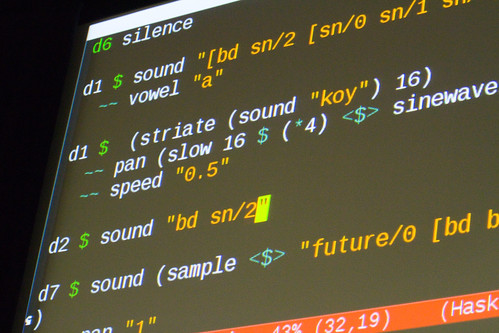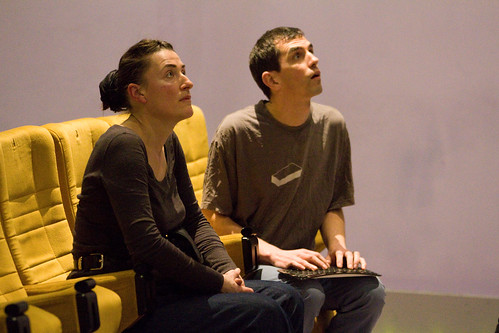A couple of weekends ago I collaborated on a performance with Hester Reeve at the LoveBytes festival for the Live Notation project.
As I was struggling with my new “smoothdirt” live coding language, Hester moved around the cinema carrying out actions including with bells, pebbles in her mouth and a large rock. This aspect seems like a form of live ritual; developing rituals while following them. We had decided that the performance should be an engagement through sound, and without any technologically mediated connection beyond microphone and loudspeakers.
I used a wireless keyboard with the cinema as my screen, and had planned to move around more while playing with the multi channel sound in the cinema, but the audience was unexpectedly large, and so I settled in the seats at the front. This meant I missed out on seeing much of what Hester was up to, and the interaction was just through sound.
This was an experimental performance in that there was no rehearsal and it was certainly possible that it could have been a failure. It wasn’t that in my eyes, but I wish I could know what the audience’s experience of it was, good and bad. For me it was a struggle, but in the way that it should have been for a research performance — I was learning a new way of working, with new software I have written but have not yet properly understood. I think the experience was similar with Hester, whose work had not foregrounded sound in this way before. I wonder how much of this the audience picked up on.
In the end time passed very quickly for me, and at some point Hester completed her live work and decided to sit next to me, while I brought the music to a conclusion. The music by the way was intended to shift between “grid-based” techno and smoother textures, using the quadrophonic system to contrast and integrate these themes. This is what I’m writing smoothdirt for, and I’m really happy that I got enough of my ideas working to form the basis of my part of this performance.
Most of all though this collaboration is opening up a broader understanding for what performing with programming languages means. We’ll be discussing this, alongside perspectives from the “other side” of live artists, at an event in London on April 19th, I’m really looking forward to seeing where all this leads.



